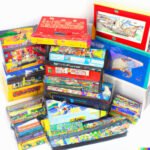Introduction
Board games are any type of game that is played on a board. These can vary from strategy and adventure-style games to cooperative or competitive ones. They’re a great way to spend quality time with family and friends, unplug from technology, and challenge yourself mentally. There are also many educational benefits such as engaging in stimulating conversations and improving problem-solving skills.
If you’re new to playing board games, it’s a good idea to start by looking online for reviews of popular, beginner-friendly games like Catan, Ticket to Ride and Pandemic – all which have easier rulesets to understand than more complex boardgames like Twilight Imperium. To find more of these, consider following YouTube reviews and checking out forums dedicated to discussing particular games. Once you’ve identified some titles you’d like to try out – either go ahead and buy them or invite your friends/family over for a game night!
Other alternatives are subscription services such as Zatu Games which offer regular subscriptions with discounts on certain titles so you can try different kinds of these without spending too much money at once. Similarly, there’s LittlewargamesUK who offer gaming bundles tailored for families or big groups of up to 8 people – perfect for larger game nights! Lastly, try visiting local stores that sell tabletop games where friendly staff will be able to recommend the perfect game for anyone interested in getting into the hobby or give advice about how to play a specific title.
Choose the Right Board Game
When starting out with board games, the first thing you should consider is which board game is right for you. The type of board game that you choose will depend on several different factors.
Difficulty level is an important factor to think about – especially if you are just beginning. Do you want something that will be easy to learn and don’t take too long to play, or would you prefer a more challenging game? Different games have different levels of difficulty and should always be taken into account when deciding which game to play.
The number of players matters as well since different games are designed for different numbers of players. Consider how many total people will be playing before getting started so that there is no confusion or mismatch later on.
You may also want to pay attention to the theme of the board game, which can enhance your gaming experience or ruin it for some individuals depending on their personal preferences and interests. Make sure everyone agrees on one that appeals to them beforehand!
Playtime and cost are additional factors when selecting the perfect board game. Some might require a lot more time than others, so determine if this fits with your available schedule and budget before investing in a particular title. Additionally, some genres tend to appeal more often than others do, so consider what style of game everyone enjoys before committing!
Set Up the Game
Once you have chosen a board game, there are a few steps you must take before you can begin to play. First, collect all necessary components and read through the instructions. The first step is to make sure that you have all the necessary pieces that come with the game and then determine if any special set up is required (for example: putting together figurines or building a gameboard). If this is the case, be sure to follow all the instructions provided by the manufacturer in order to set things up properly so that when it comes time to play, everything will run smoothly. After all components have been gathered and setup has been done properly, make sure each player understands how to operate their pieces accordingly. Depending on the type of game being played (and whether or not it requires strategy), players may need to familiarize themselves with rules and other tips before they can fully enjoy the game experience. Make sure each person playing understands details such as how turns go around in rotation, when each card should be drawn, what rolls are needed on dice, etc. This is important because miscommunication about how such points are handled can often lead to confusion during gameplay or worse ” loss of interest in continuing! When everyone has gone over how it works one more time and is confident enough in their knowledge, it’s time for everyone to start playing!
Playing the Game
Playing board games can be a great way to pass the time, have some fun, and challenge yourself at the same time. Before starting a game, get familiar with the general rules and objectives. Also, introduce house rules or interesting variants so you can tailor your experience to fit what type of game you’d like to have. Make sure everyone understands each rule before playing! Once all players are ready, determine who will go first and follow turns in that order for the rest of the game. During each turn strategize your moves and think about how they affect everyone else’s move as well – what can you do now that will prevent anyone else from getting ahead? Finally, be sure to enjoy the experience! Whether you win or lose, remember that it’s all just part of a fun game.
Strategizing Your Moves
Getting started with board games can be an exciting and rewarding experience. To make the most of playing these types of games, it’s important to strategize your moves. This means taking a few moments to analyze potential outcomes in order to make informed and calculated decisions that could lead you to achieving your goals.
When strategizing, it is important to consider each available option and weigh their relative consequences in relation to the goal at hand. This could mean considering moves that have high immediate payoff versus those that may have larger long-term benefits. Additionally, it’s important to think about how other players may act once you’ve taken your turn and how this impact could potentially be amplified or diminished depending on what action you take. When planning for victory, it is essential to look ahead rather than focusing only on the current moment.
Furthermore, since the idea of outsmarting other players is part of why board games are so enjoyable, try to find strategic tips online presented by experienced gamers who can provide helpful advice on improving one’s approach. You can also keep track of how well you’re doing in each game compared to past performances as a useful insight into where your skills lie and where improvements may be needed for future games. With practice and dedication, success will come!
Ending the Game
Declaring a Winner
Depending on the game you are playing, there could be multiple ways to reach a winner. It could be based on the accumulation of points, or taking out other players, or just being the first one to do something. Take the time to find out how the game should end and make sure you declare a clear winner once they have achieved it.
Tallying Scores
When it’s necessary, tally up scores at the end of each round or after every few turns. Make sure everyone is aware of their score as you go in case there’s some dispute over who really won at the end. This can also help lead into arguments about any doubtful plays during the game.
Settling Arguments
In any type of tabletop gaming, disagreements between players will occur from time to time. Whether these arguments are serious or casual, take some time to resolve them before continuing with gameplay. Most importantly, make sure that everyone leaves feeling heard and respected even if an argument was not necessarily solved!
Putting Pieces Away
Once all scores have been tallied and all arguments have been settled, make sure that everything is put away properly so that when it’s ready for another game later on nothing will be missing or misplaced. If this is part of a routine where you put away your games right after playing then remember to dust off any surfaces and clean off cards or pieces needed for future play!
Reflect on the Fun
At lastly reflect on how your session went! Did everyone feel like they were able to get what they wanted out of it? Did everyone come back next time wanting more? Did laughter arise throughout playing? What drives people to continue coming back and making board-gaming an enjoyable experience – spend some time thinking about these questions afterwards as well!
Conclusion
Reviewing the key points from this guide will help you quickly get up to speed on many aspects of board gaming. It’s important to understand the various components involved in a game, such as pieces, boards, cards, and other components. Additionally, it is useful to explore different game variations that are available to provide a unique gaming experience.
Finally, looking forward to the next game is essential for having a successful board gaming experience. Not only does this give players something look forward to, but it also allows them to continually refine their skills so they can stay on top of their game. With the information outlined in this guide, you should now have a fundamental understanding of how to get started with board games and be able enjoy them with family and friends!

I love playing all kinds of games – from classics like Monopoly to modern favourites like Ticket to Ride.
I created this blog as a way to share my love of board games with others, and provide information on the latest releases and news in the industry.





